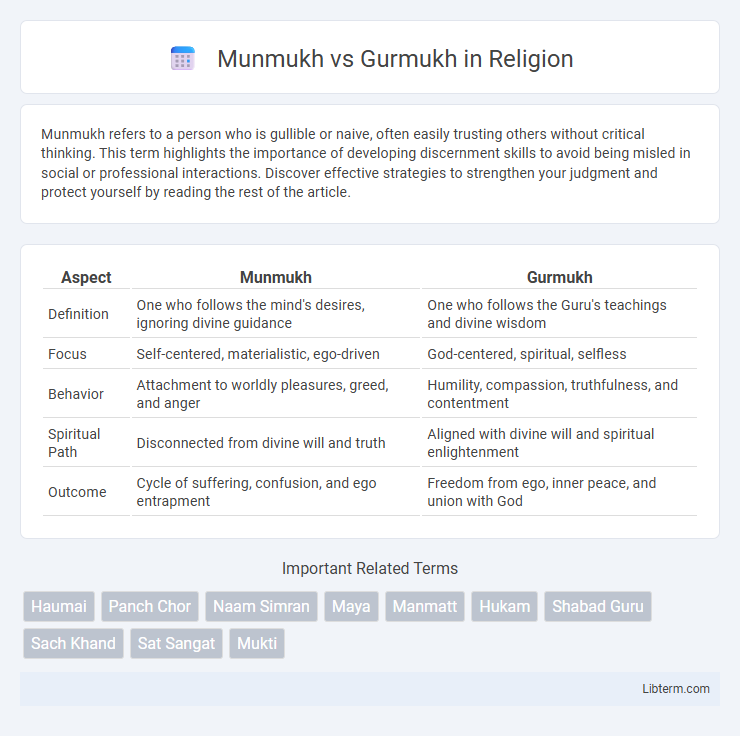Munmukh refers to a person who is gullible or naive, often easily trusting others without critical thinking. This term highlights the importance of developing discernment skills to avoid being misled in social or professional interactions. Discover effective strategies to strengthen your judgment and protect yourself by reading the rest of the article.
Table of Comparison
| Aspect | Munmukh | Gurmukh |
|---|---|---|
| Definition | One who follows the mind's desires, ignoring divine guidance | One who follows the Guru's teachings and divine wisdom |
| Focus | Self-centered, materialistic, ego-driven | God-centered, spiritual, selfless |
| Behavior | Attachment to worldly pleasures, greed, and anger | Humility, compassion, truthfulness, and contentment |
| Spiritual Path | Disconnected from divine will and truth | Aligned with divine will and spiritual enlightenment |
| Outcome | Cycle of suffering, confusion, and ego entrapment | Freedom from ego, inner peace, and union with God |
Understanding Munmukh and Gurmukh
Munmukh refers to an individual driven by ego, desires, and external influences, often leading to a self-centered and superficial life. Gurmukh, in contrast, embodies a spiritually enlightened person who follows the teachings of the Guru, prioritizing inner values, selflessness, and divine guidance. The distinction between Munmukh and Gurmukh lies in their orientation--Munmukh looks outward to temporary pleasures while Gurmukh turns inward toward eternal wisdom.
Etymology and Linguistic Roots
Munmukh derives from Punjabi roots, where "mun" means mind and "mukh" means face or orientation, implying one who follows the mind or self-centered desires. Gurmukh combines "gur," referring to the Guru or spiritual guide, and "mukh," indicating one who faces or follows the Guru's teachings. These etymologies highlight the contrast between an ego-driven orientation (Munmukh) and a spiritually guided path (Gurmukh) within Sikh philosophy.
Philosophical Foundations
Munmukh and Gurmukh represent contrasting philosophical foundations in Sikhism; Munmukh signifies self-centeredness and attachment to material desires, while Gurmukh embodies alignment with divine will and spiritual wisdom. The concept of Munmukh is rooted in ego, ignorance, and maya, leading to a life driven by transient worldly illusions. In contrast, Gurmukh arises from internalizing Gurbani teachings and living in accordance with Hukam, fostering detachment from ego and cultivating eternal truth and humility.
Core Characteristics of a Munmukh
A Munmukh is characterized by being self-centered, ignorant of spiritual wisdom, and driven by ego and material desires, often leading to confusion and moral decline. This state contrasts with awareness and inner focus, as a Munmukh follows external influences without discerning truth, resulting in attachment to transient worldly pleasures. Core traits include lack of introspection, susceptibility to negative emotions such as anger and greed, and alienation from higher spiritual consciousness.
Core Traits of a Gurmukh
A Gurmukh embodies qualities like humility, compassion, and unwavering devotion to spiritual wisdom, fostering harmony within themselves and their community. They prioritize inner growth, aligning their actions with divine will and practicing selfless service, which cultivates a life of contentment and ethical living. The core traits of a Gurmukh emphasize mindfulness, ethical discipline, and a deep connection to the Guru's teachings, contrasting with the self-centered and materialistic focus of a Munmukh.
Spiritual Pathways: Ego vs. Submission
Munmukh refers to an individual guided by ego, often driven by selfish desires and ignorance, leading to spiritual blindness and attachment to the material world. Gurmukh embodies submission to divine wisdom and the teachings of the Guru, fostering humility, self-realization, and alignment with higher spiritual truths. The spiritual pathway of Munmukh traps one in cycles of ego-centric suffering, while Gurmukh's path leads to liberation through surrender and inner transformation.
Munmukh and Gurmukh in Gurbani
In Gurbani, Munmukh refers to an individual led by the mind or worldly desires, often ignoring divine wisdom and spiritual guidance, resulting in suffering and ignorance. Gurmukh describes a soul oriented towards the Guru's teachings, embodying humility, devotion, and alignment with God's will as emphasized in Guru Granth Sahib. Sikh scriptures highlight the transformative power of becoming Gurmukh by transcending Munmukh tendencies through Naam Simran and selfless service.
Real-life Implications and Behaviors
Munmukh describes individuals driven by ego and sensory desires, leading to impulsive actions and short-term gratification that often result in stress and dissatisfaction. Gurmukh represents those aligned with spiritual wisdom and ethical living, exhibiting patience, empathy, and self-discipline that foster inner peace and harmonious relationships. The contrast between Munmukh and Gurmukh behaviors significantly influences mental health, decision-making, and social interactions, highlighting the practical importance of spiritual mindfulness in everyday life.
Transforming from Munmukh to Gurmukh
Transforming from Munmukh to Gurmukh involves shifting from self-centered, ego-driven behavior to a life guided by divine wisdom and humility. This spiritual evolution emphasizes aligning thoughts and actions with the teachings of Gurbani, focusing on inner purity and connecting with the divine. Consistent meditation on God's name and adopting a selfless attitude enable one to overcome ignorance and embrace the enlightened path of a Gurmukh.
Relevance in Contemporary Sikh Life
Munmukh, characterized by self-centered desires and ignorance, contrasts sharply with Gurmukh, who embodies spiritual wisdom and alignment with Guru's teachings. This dichotomy remains highly relevant in contemporary Sikh life as followers strive to overcome ego and materialism to live with humility, compassion, and devotion. Adopting the Gurmukh approach fosters inner peace and strengthens community bonds, reflecting core Sikh values in modern society.
Munmukh Infographic

 libterm.com
libterm.com